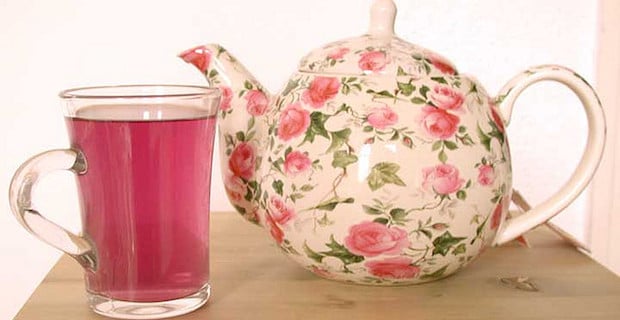
A cup of sour tea may not be the first beverage that comes to mind when you are thinking about having something to drink. But don’t let the name scare you away, because the health benefits of sour tea (aka hibiscus tea) plus its unique taste should be enough for you to at least put it on your “to do” list.
Why drink hibiscus tea?
The hibiscus is the state flower of Hawaii, and in addition to hanging around the necks of arriving guests, the dried flower is also a healthful tea that can be enjoyed either hot or cold. In Burma and India, the leaves are enjoyed as a vegetable while in Mexico, the dried flower is a delicacy.
Read about the health benefits of tea
Hibiscus tea has a sour, tangy taste that can be tempered with a bit of honey, agave, or other natural sweetener. It’s also easy to find herbal tea blends in which hibiscus tea is the main ingredient, and these teas are generally far from “sour.”
Scientists have studied the hibiscus (Hibiscus sabdariffa) and its use in both animals and humans and discovered it has antioxidant, anticholesterol, and antihypertensive properties. One study that appeared in the Journal of Nutrition specifically examined the ability of hibiscus tea to lower blood pressure.
The randomized, double-blind, placebo-controlled clinical trial involved 65 adults (age 30-70) who had prehypertension or mild hypertension. None of them were taking medication for blood pressure control. They were assigned to consume either three 240-ml (8 oz) servings per day of hibiscus tea or a placebo tea for six weeks.
At the end of six weeks, the participants who had consumed hibiscus tea showed an average decline of 7.2 mmHg in systolic blood pressure compared with only 1.3 mmHg in the placebo group. The change in diastolic pressure between the two groups was slight and similar.
Read more about better blood pressure
In a more recent report, experts reviewed animal and human studies of hibiscus and its impact on cholesterol and blood pressure. From the studies performed thus far, they were able to report that:
- Hibiscus is a diuretic, but the effect appears to be mild
- In animal studies, hibiscus extract reduced blood pressure in a dose-dependent manner
- In adults with prehypertension or mild hypertension and type 2 diabetes, daily use of hibiscus lowered blood pressure
- Hibiscus extract was as effective as captopril (a blood pressure medication) but not as effective as Lisinopril
- Most animals with either normal or elevated lipids (cholesterol and triglycerides) lipids and diabetes responded well to hibiscus
- The phytochemicals believed to be responsible for these health benefits are called anthocyanins, but experts say that hibiscus acid and polyphenols also may have a role
Read more about polyphenols and heart health
Overall, researchers reported that hibiscus extracts “are promising as a treatment of hypertension and hyperlipidemia,” although they also believe more comprehensive animal and human studies are necessary before any recommendations for use can be made.
Enjoy hibiscus tea!
That doesn’t mean you can’t enjoy this healthy beverage right now and every day. If you use dried hibiscus flowers, add ½ cup of the flowers to 3 cups of boiling water, remove the pot from the heat, and let the tea steep for 15 to 20 minutes. You can adjust the amount of flowers to suit your taste and/or add a cinnamon stick during the steeping process. Strain and enjoy the tea hot or allow it to cool further and serve over ice.
Hibiscus tea is also available in tea bags either alone or mixed with other flavors. As I finish this article, I am enjoying a hot cup of hibiscus tea with a hint of licorice root, orange peel, and lemongrass. This was not my first experience with hibiscus tea, and I know it won’t be my last!
Photo: Nadya Peek




